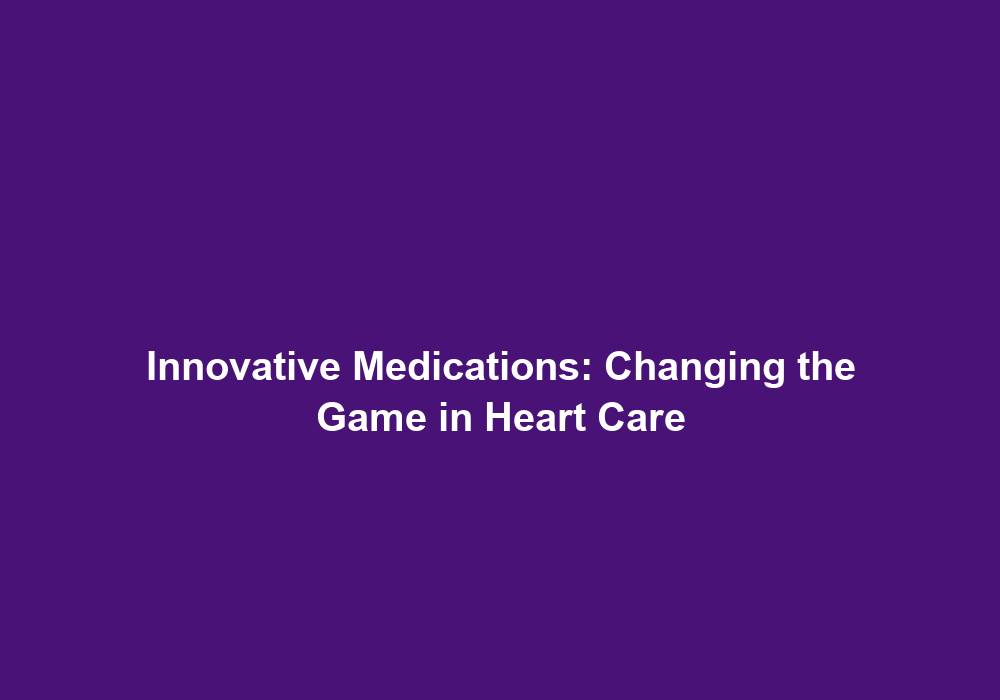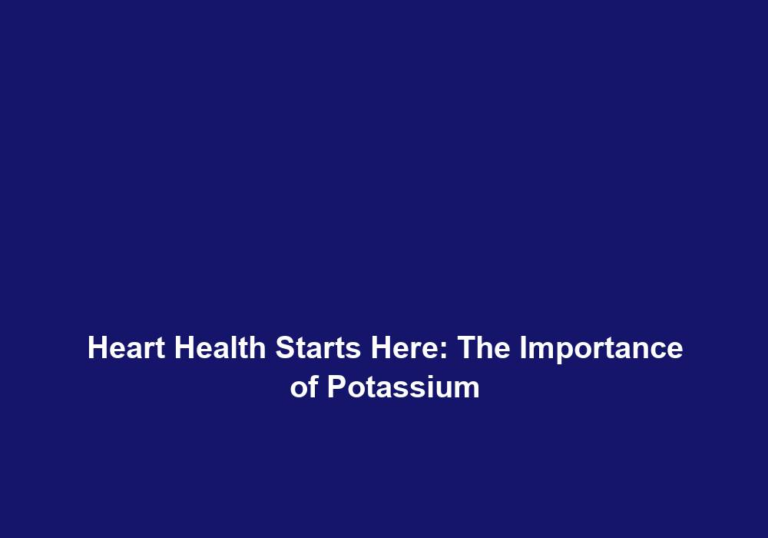Innovative Medications: Changing the Game in Heart Care
The field of heart care has witnessed remarkable advancements in recent years, thanks to the development of innovative medications. These groundbreaking drugs have revolutionized the way we approach the prevention, treatment, and management of heart-related conditions. With their immense potential to improve patient outcomes and enhance the quality of life, these medications are truly changing the game in heart care.
Advancements in Medications for Heart Conditions
1. Novel Therapeutic Approaches
Innovative medications have paved the way for novel therapeutic approaches in the management of heart conditions. These drugs not only target the symptoms but also address the underlying causes, offering a comprehensive treatment approach. By targeting the root cause of the disease, these medications have the potential to provide long-term benefits by modifying the disease process itself. This shift from symptom management to disease modification has significantly improved patient outcomes, leading to a better quality of life and increased life expectancy.
In addition to targeting symptoms, innovative medications also focus on specific pathways and molecular targets involved in the development and progression of heart conditions. By understanding the molecular mechanisms underlying these diseases, researchers have been able to develop drugs that can effectively intervene and disrupt the disease process. This precision targeting allows for more effective treatment strategies and personalized medicine approaches tailored to individual patients’ needs.
Furthermore, these novel therapeutic approaches not only address the symptoms but also aim to prevent the occurrence of cardiovascular events. By targeting risk factors such as high blood pressure, high cholesterol, and diabetes, these medications help reduce the likelihood of developing life-threatening conditions like heart attacks and strokes. This proactive approach to heart care is crucial in preventing the progression of heart disease and preserving cardiac health.
2. Precision Medicine
With the advent of innovative medications, the concept of precision medicine has gained tremendous momentum in heart care. Instead of employing a one-size-fits-all approach, these drugs take into account individual variations in genetic makeup, lifestyle, and environmental factors. This personalized medicine approach ensures that patients receive the most effective treatment tailored to their specific needs, leading to optimal results.
Precision medicine utilizes advanced technologies such as genetic testing and biomarker analysis to identify specific genetic variations and molecular markers that influence an individual’s response to treatment. By understanding these genetic and molecular profiles, healthcare providers can select the most appropriate medication and dosage for each patient. This tailored approach improves treatment outcomes by maximizing efficacy and minimizing adverse effects.
In addition to genetic factors, precision medicine also considers lifestyle and environmental factors that can impact an individual’s response to medication. By taking into account factors such as diet, exercise, and exposure to environmental toxins, healthcare providers can further optimize treatment plans and improve patient outcomes. This holistic approach to heart care ensures that each patient receives personalized treatment that addresses their unique needs and circumstances.
3. Reduced Side Effects
Traditional heart medications often come with a range of side effects, which can sometimes be debilitating for patients. However, innovative medications have been designed to minimize these adverse effects while maximizing therapeutic benefits. Through careful drug development and extensive clinical trials, pharmaceutical companies have been able to strike a balance between efficacy and safety, ensuring that patients can receive the necessary treatment without compromising their well-being.
One of the strategies employed to reduce side effects is the development of medications that specifically target the affected tissues or organs, minimizing off-target effects. Additionally, advancements in drug delivery systems have allowed for more precise and controlled release of the medication, reducing the risk of systemic side effects. By improving the pharmacokinetics and pharmacodynamics of these drugs, researchers have been able to enhance their safety profiles.
Furthermore, innovative medications often undergo rigorous testing in clinical trials to identify and minimize potential side effects. By closely monitoring patients and collecting data on adverse reactions, researchers can identify any safety concerns and refine the drug formulation or dosage to improve patient tolerability. This commitment to patient safety ensures that the benefits of these medications outweigh the potential risks.
4. Enhanced Drug Delivery Systems
In addition to the development of novel medications, advancements in drug delivery systems have significantly improved the efficacy and convenience of treatment. Innovative technologies such as transdermal patches, extended-release formulations, and implantable devices have revolutionized the way medications are administered. These delivery systems not only ensure a steady release of the drug but also enhance patient compliance, making it easier for individuals to adhere to their prescribed treatment regimen.
Transdermal patches are an example of an innovative drug delivery system that offers several advantages. These patches deliver medication directly through the skin, bypassing the digestive system and avoiding issues such as gastrointestinal irritation or degradation. This route of administration also provides a controlled release of the medication, maintaining therapeutic levels in the bloodstream over an extended period. Additionally, transdermal patches offer convenience and ease of use, eliminating the need for frequent dosing.
Extended-release formulations are another advancement in drug delivery systems that have improved the efficacy and convenience of treatment. These formulations allow for a slow and controlled release of the medication, ensuring a sustained therapeutic effect. This reduces the frequency of dosing, making it more convenient for patients and improving adherence to the treatment plan. Extended-release formulations are particularly beneficial for medications that require a steady concentration in the bloodstream to achieve optimal therapeutic outcomes.
Implantable devices, such as drug-eluting stents, have also played a significant role in enhancing drug delivery in heart care. These devices are inserted into blood vessels during surgical procedures and slowly release medication to prevent restenosis (re-narrowing of the blood vessels). By directly delivering medication to the site of action, implantable devices ensure maximum therapeutic effect while minimizing systemic exposure and potential side effects.
Significance of Innovative Medications in Heart Care
1. Prevention of Cardiovascular Events
Innovative medications have proven to be effective in preventing cardiovascular events, such as heart attacks and strokes. By targeting risk factors such as high blood pressure, high cholesterol, and diabetes, these drugs help reduce the likelihood of developing life-threatening conditions. This proactive approach to heart care is crucial in preventing the progression of heart disease and preserving cardiac health.
In addition to managing symptoms and addressing underlying causes, innovative medications focus on preventing the occurrence of cardiovascular events. For example, medications that lower blood pressure and cholesterol levels significantly reduce the risk of heart attacks and strokes. By controlling these risk factors, these medications play a vital role in maintaining cardiovascular health and preventing life-threatening events.
Furthermore, innovative medications often work synergistically with lifestyle modifications, such as exercise and a healthy diet, to further reduce the risk of cardiovascular events. By combining medication with lifestyle changes, patients can achieve optimal outcomes and minimize the need for invasive procedures or emergency interventions.
2. Management of Chronic Heart Conditions
For individuals living with chronic heart conditions, innovative medications have been a game-changer. These drugs not only alleviate symptoms but also slow down the progression of the disease, improving overall cardiac function. By managing conditions such as heart failure, arrhythmias, and angina, these medications significantly enhance the quality of life and reduce hospitalization rates.
Innovative medications offer targeted treatment options for various chronic heart conditions. For example, medications that improve heart function and reduce fluid retention are commonly prescribed for heart failure patients. These drugs help alleviate symptoms such as shortness of breath and fatigue, improving patients’ overall well-being and functional capacity.
Furthermore, medications that regulate heart rhythm, such as antiarrhythmic drugs, play a crucial role in managing arrhythmias. By preventing abnormal heart rhythms, these medications reduce the risk of complications and improve patients’ quality of life. Similarly, medications that relieve chest pain and improve blood flow to the heart, such as nitroglycerin, are commonly used to manage angina.
By effectively managing chronic heart conditions, innovative medications help individuals lead fulfilling lives and reduce the burden on healthcare systems. These drugs not only improve symptoms but also slow down disease progression, potentially delaying the need for invasive interventions such as surgeries or heart transplants.
3. Improved Survival Rates
The introduction of innovative medications in heart care has led to a substantial improvement in survival rates for patients with various heart conditions. By targeting specific pathways involved in disease progression, these drugs have been able to extend the life expectancy of individuals living with heart disease. This remarkable achievement is a testament to the immense potential of innovative medications in transforming the outlook for patients and their loved ones.
Innovative medications have significantly contributed to reducing mortality rates associated with heart conditions. For example, medications that lower cholesterol levels have been shown to reduce the risk of cardiovascular events and improve survival rates in individuals with high cholesterol. Similarly, medications that lower blood pressure help prevent complications such as heart attacks, strokes, and heart failure, ultimately improving long-term survival.
Furthermore, medications that improve heart function and manage heart failure have been instrumental in prolonging survival rates. These drugs optimize cardiac performance, reduce symptoms, and prevent disease progression, allowing patients to live longer, fulfilling lives. By effectively managing chronic heart conditions, innovative medications offer hope and improved outcomes for patients and their families.
Future Directions for Innovative Medications in Heart Care
The development of innovative medications in heart care is an evolving field, with ongoing research and advancements taking place. Here are some potential future directions for these groundbreaking drugs:
1. Gene Therapy
The use of gene therapy holds great promise in the field of heart care. By targeting specific genes associated with cardiovascular diseases, researchers aim to correct genetic abnormalities and restore normal cardiac function. This revolutionary approach has the potential to provide long-term solutions for individuals with inherited heart conditions, offering a new dimension in personalized medicine.
Gene therapy involves the introduction of healthy genes into the patient’s cells to compensate for defective or mutated genes. By correcting the underlying genetic abnormalities, researchers hope to prevent or reverse the development of cardiovascular diseases. This approach has the potential to revolutionize the treatment of inherited heart conditions, such as hypertrophic cardiomyopathy or familial hypercholesterolemia, by addressing the root cause of the disease.
While gene therapy is still in its early stages, significant progress has been made in preclinical and clinical trials. Researchers are continuously exploring new delivery methods and refining gene-editing techniques to improve the safety and efficacy of this approach. As research in gene therapy advances, it holds the potential to transform the landscape of heart care by providing targeted treatments tailored to an individual’s genetic makeup.
2. Stem Cell Therapy
Stem cell therapy has gained significant attention as a potential treatment for heart conditions. By harnessing the regenerative capabilities of stem cells, researchers aim to repair damaged heart tissue and improve cardiac function. This innovative approach has the potential to revolutionize the management of conditions such as heart failure and myocardial infarction, offering hope to patients who previously had limited treatment options.
Stem cells have the unique ability to differentiate into various cell types, including heart muscle cells. Researchers are exploring different types of stem cells, such as embryonic stem cells, induced pluripotent stem cells, and adult stem cells, for their therapeutic potential in heart care. These cells can be injected directly into the heart or administered intravenously to promote tissue repair and regeneration.
Numerous preclinical and clinical studies have demonstrated the safety and efficacy of stem cell therapy in improving cardiac function and reducing the size of scarred tissue. While challenges remain, such as optimizing cell delivery, survival, and integration into the host tissue, stem cell therapy holds great promise for the future of heart care. Ongoing research aims to refine this approach and expand its application to a wider range of heart conditions.
3. Combination Therapies
Combining different medications with complementary mechanisms of action is another exciting avenue in heart care. By targeting multiple pathways involved in the development and progression of heart conditions, combination therapies can enhance treatment efficacy and maximize patient outcomes. This integrative approach holds the potential for synergistic effects and improved long-term management of complex cardiovascular diseases.
Combination therapies involve the simultaneous use of multiple medications that work synergistically to achieve better treatment outcomes. For example, a combination of medications targeting blood pressure, cholesterol levels, and platelet aggregation can effectively reduce the risk of cardiovascular events in high-risk individuals. By addressing multiple risk factors, combination therapies provide a comprehensive approach to heart care.
Furthermore, combination therapies can also involve the use of medications in conjunction with lifestyle modifications. For instance, combining medication with regular exercise and a healthy diet can lead to better outcomes in managing conditions such as obesity, diabetes, and metabolic syndrome. This integrated approach addresses both the medical and lifestyle aspects of heart care, maximizing the potential for improved patient outcomes.
Conclusion
Innovative medications have undoubtedly changed the game in heart care. These groundbreaking drugs have brought forth novel therapeutic approaches, personalized medicine, reduced side effects, and enhanced drug delivery systems. They have significantly improved patient outcomes, prevented cardiovascular events, and prolonged survival rates. As we look to the future, ongoing research in gene therapy, stem cell therapy, and combination therapies holds great promise for further advancements in the field. With the continued development of innovative medications, we can expect to witness even greater strides in heart care, ensuring a healthier and brighter future for individuals living with heart conditions.







